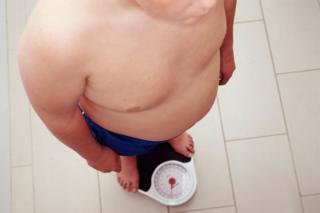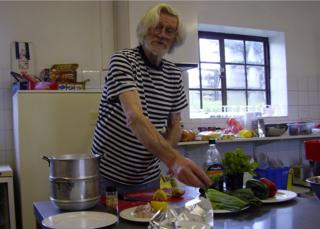 Image copyright Science Photo Library
Image copyright Science Photo Library Around one in ten UK children in Reception and a fifth of UK children leaving primary school are obese.
A Royal Society for Public Health( RSPH) report said healthy ingesting vouchers and after-school works could be the answer.
But other people who work with parents of overweight children say different measures work better.
So what can be done to help prevent or reduce child obesity?
Simple advice
The government’s main approaching to undertaking child obesity is through advice strategies like Change4Life, set up in 2009.
It offer advice and gratuities for families to encourage lifestyle changes – including recipes and activity ideas.
A government spokesman said since Change4Life was started, more than 2.7 million people have signed up and it now has more than 200 national partners.
There is some evidence to suggest current measures are working, as the increasing numbers of overweight under-1 0s has remained at around 30% in the past decades and could be ‘levelling off’.
But they only work if beings sign themselves up and motivate themselves to follow the advisories and make changes.

Food vouchers
Healthy snacking nutrient vouchers could be given to families with overweight or obese children, to give them an incentive to buy more fresh meat like fresh fruit and vegetables.
The RSPH indicated this could be operated in a similar way to the government’s Healthy Start means-tested scheme for pregnant women and fathers with children under four.
They said the voucher strategy could be funded by supermarkets’ social responsibility programs to reduce the cost to government.
Cookery sciences workshops
Some community organisations who work directly with parent education overweight and obese children say there is little point in throwing households food vouchers if they don’t know how to use the ingredients.
This approach has prevailed backers such as Jamie Oliver, who runs Ministry of Food outreach cores in the Midlands and North East of England.
At the Friendly Food Club, around 300 low-income families in Dorset, Wiltshire and Hampshire have been helped by Tony Gibbons to cook tasty and healthy meals through free shops funded by committees, housing associations, kindness and even football clubs.
He said community-led cookery shops are a course of demonstrating households sciences which can be overtaken between generations and neighbours to inspire long-term outcomes.
 Image copyright Tony Gibbons
Image copyright Tony Gibbons During the past 10 years he has worked with everyone from young mums to children who have never eaten vegetables, in obesity ‘hotspot’ areas.
These include neighbourhoods like Weymouth and Portland in Dorset – where last year the National Child Measurement Programme divulged more than a part of reception pupils and almost a one-third of time six students were overweight or obese.
He said the families he work with are often unaware of authority schemes like Change4Life.
“I work mainly with groups in social housing who are totally against government interference anyway. The react is to get inside the parents’ fronts and show them that there are health foods which nice to eat, that aren’t all related to being ‘on a diet’, ” he said.
Alongside practical cookery workshops, Mr Gibbons starts shopping for supermarket deals with the families and shows them how to usage all the nutrient in their cupboards.
He said it causes the parents and children skills so they can regularly include fresh food like fresh fruit and vegetables in a wide range of meals.
“It’s about generating them confidence to shape something for the first time, trying to do it on a peer rank and is collaborating with people who will then go and talk to their neighbours about it, ” he said.
Exercise
How much practice should children do, and which kinds of utilization are the best in structuring long-term healthy habits?
Some schools have already taken on the challenge of get children to move more, through walk-to-school bus or after-school sessions like hop classes.
In Stirling, Scotland, a pioneering schoolteacher facilitated set up a ‘daily mile’ strategy to ensure all the students lope or stroll a mile every day.
Other groups are targeting parents as well as their children with informal exercise sessions. In Somerset, free clas paths are being offered through such partnerships between South Somerset District Council and Walking for Health, England’s largest network of going schemes.
 Image copyright Thinkstock
Image copyright Thinkstock As well as offering ‘buggy walks’ for mums children, they are setting up acts for the whole family to introduce into their weekly routine.
The walking hearings has been favourite and last year expect rose by 40%, with around 8,000 beings taking part.
“The gaits are free-spoken clas rehearsal where mothers can also socialise, ” said Charlie Coward, healthy lifestyles officer at the council.
“For children, it’s innovating a healthy but informal work like football, cycling or paths rather than organizes PE or the gym because as they get older, confidence stops off.
“Family works normalise that action so children carry it through to later life.”

